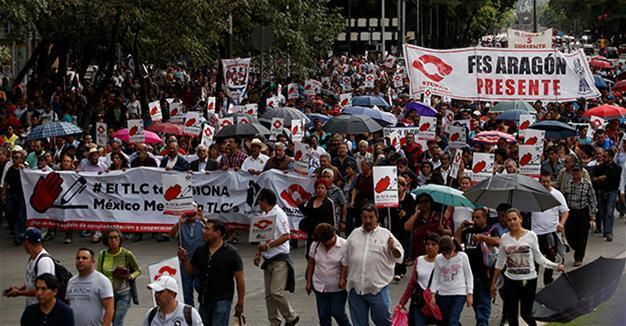US demands big NAFTA changes, setting stage for tough talks
WASHINGTON - The Associated Press
 The United States won’t settle for cosmetic changes to the North American Free Trade Agreement, the top U.S. trade negotiator said, as negotiations to rework terms of the pact began.
The United States won’t settle for cosmetic changes to the North American Free Trade Agreement, the top U.S. trade negotiator said, as negotiations to rework terms of the pact began.U.S. President Donald Trump has called the 23-year-old trade pact the “worst” in history and vowed to fix it - or withdraw from it.
On the first of five days of talks, U.S. Trade Rep. Robert Lighthizer said on Aug. 16 that Trump “is not interested in a mere tweaking of a few provisions and an updating of a few chapters. We believe NAFTA has fundamentally failed many, many Americans and needs major improvement.”
NAFTA did away with most barriers, including tariffs, on trade between the U.S., Canada and Mexico.
The Trump administration and other NAFTA critics say the agreement encouraged manufacturers to move south of the border to take advantage of lower-wage Mexican labor. Lighthizer said that at least 700,000 Americans have lost their jobs because of the way NAFTA rerouted commerce.
The U.S. trade representative said he wanted to change the pact to require that duty-free NAFTA products contain more content made within the trade bloc and specifically in the United States. But Stephen Orava, partner and head of the trade law practice at King & Spalding, said that changing NAFTA’s “rules of origin” to promote Made-in-the-USA products would prove “complicated” and risk disrupting the intricate supply chains that manufacturers have built across NAFTA borders.
Lighthizer’s comments suggest the negotiations could prove contentious. The Canadian and Mexican negotiators say NAFTA needs to be updated, but they defended it as an economic success story.
“We have to take very great care in making changes,” Chrystia Freeland, Canada’s minister of foreign affairs, told reporters after the first day of talks.
Mexican Economy Minister Ildefonso Guajardo said, “I am not denying that there have been some transfer of jobs.” He said the goal of the negotiators should be to improve the agreement to make sure “at the end of the day, we are part of the solution and not part of the problem.”
Guajardo said he expected the talks this week to lay out opening positions with the hope that when the negotiations resume next month in Mexico City progress can start to be made in narrowing the differences.
“We are looking for a constructive process that will take NAFTA into the 21st century,” he said.
NAFTA critic Lori Wallach, director of Public Citizen’s Global Trade Watch, said Lighthizer’s tough talk raises the possibility that the United States will pull out of NAFTA if it can’t get the deal it wants.
“He doesn’t bluff,” she said. “It was a message to Mexico and Canada: ‘We hope we can reach a deal, but we aren’t playing.’ “
















